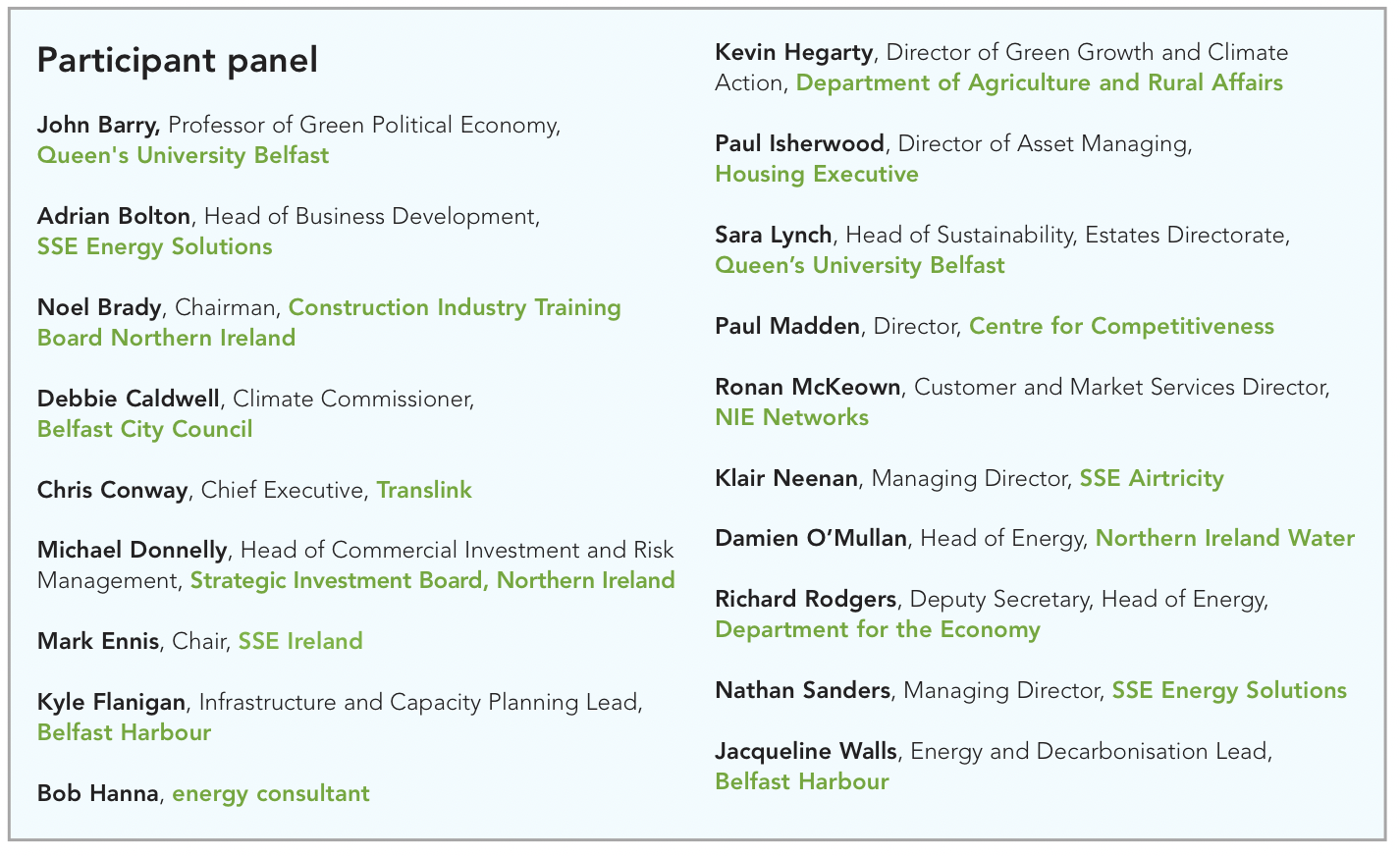Achieving net zero decarbonisation: A collaborative effort
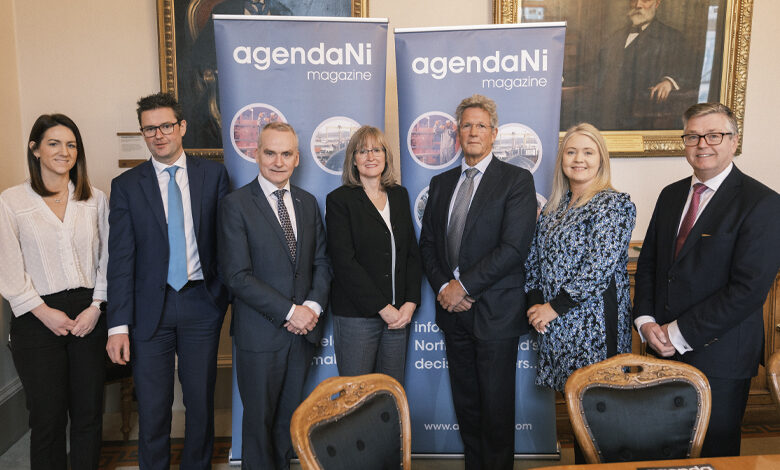
 SSE hosted a think tank with key stakeholders from across Northern Ireland’s energy sector to identify potential partnerships and pathways on the journey towards net zero decarbonisation.
SSE hosted a think tank with key stakeholders from across Northern Ireland’s energy sector to identify potential partnerships and pathways on the journey towards net zero decarbonisation.
 Nathan Sanders, Managing Director of SSE Energy Solutions opened the think tank by highlighting the importance he and his organisation place on the role of public-private collaboration in driving progress towards a net zero future. On the back of the Decarbonisation Summit held in Manchester in 2022, Sanders hopes that SSE can help kickstart the joint delivery of energy solutions in Northern Ireland to decarbonise the economy.
Nathan Sanders, Managing Director of SSE Energy Solutions opened the think tank by highlighting the importance he and his organisation place on the role of public-private collaboration in driving progress towards a net zero future. On the back of the Decarbonisation Summit held in Manchester in 2022, Sanders hopes that SSE can help kickstart the joint delivery of energy solutions in Northern Ireland to decarbonise the economy.
Sanders outlines that SSE is pushing ahead with generation projects across the UK, not least the UK’s largest offshore windfarm, Dogger Bank, which will have enough capacity to power six million homes by 2026.
However, the organisation also has a distributed energy division business which is aiming to bring net zero to the end user. To this end, Sanders believes that distributed energy is central to decarbonising the energy system and providing stability to the electricity grid.
SSE plans to invest around £25 billion in low carbon infrastructure across the UK and Ireland to 2030 and creating 1,000 green jobs each year, but Sanders says that while investment is a key enabler for net zero, we also need to see the formation of trusted partnerships who can enable of whole system thinking and innovation.
“Integrating solutions and planning infrastructure to suit the needs of local areas is the solution to getting to net zero,” he explains.
“Underpinning those solutions is data, which helps inform, understand, and optimise decision-making. Creating space for the public and private sectors to become trusted partners, working in collaboration to deliver projects, is vital. To do that, we need more collaboration, where a holistic rather than a silo mentality is taken to decarbonising our communities. By doing this, we can ensure that not only do we reach net zero, but we do it in a just fashion whereby no one is left behind and our investments in green infrastructure deliver social value for the areas and the authorities we work with.”
 Setting the policy context, Head of Energy for the Department for the Economy, Deputy Secretary Richard Rodgers explains that the Climate Change Act is the legislation that will drive the net zero agenda in the coming days, months, and years. Emphasising that Northern Ireland’s ambition must be to be self-sufficient in affordable renewable energy, Rodgers points to progress under the Energy Strategy, the Northern Ireland Executive’s energy decarbonisation pathway.
Setting the policy context, Head of Energy for the Department for the Economy, Deputy Secretary Richard Rodgers explains that the Climate Change Act is the legislation that will drive the net zero agenda in the coming days, months, and years. Emphasising that Northern Ireland’s ambition must be to be self-sufficient in affordable renewable energy, Rodgers points to progress under the Energy Strategy, the Northern Ireland Executive’s energy decarbonisation pathway.
Highlighting Northern Ireland’s advantages in its relative size and abundance of natural resources, Rodgers says: “We are entering a point where there is the opportunity to access an abundance of locally produced energy, and we need to work out how to best utilise that energy to bring benefit to the economy and thus society.”
Rodgers believes that the fabric of Northern Ireland – its manufacturing and engineering skills – bodes well for the region’s prospects of not only decarbonising but delivering those solutions to the rest of the world.
Accepting that Northern Ireland will need multi-billion pound investment in new energy infrastructure, Rodgers says that the establishment of an energy decarbonisation pathway and sectoral carbon budgets has put Northern Ireland on the right trajectory.
The Head of Energy believes that technology and business innovation is part of Northern Ireland’s DNA. Collaboration, he contends, must happen at a pace which ensures that the region does not fall to the back of the supply chain queue as nations around the world strive for net zero by 2050, or earlier. Equally, he believes that academic research will play a huge role, dovetailing with collaboration on technology, to drive down cost curves and deliver the energy infrastructure that could make Northern Ireland a small, yet elite economy.

Outline the key enablers of a net zero economy. What are the priority areas in the transition?
Jacqueline Walls, Belfast Harbour
A net zero economy is a mammoth task and one in which the approach needs to be phased into short-, medium- and long-term actions. However, we are in a climate emergency and need to accelerate those actions. To do this, we need to focus on the most efficient use of our energy system. In the short term, we need the rollout of smart meters to enable consumers to make informed energy efficiency decisions and lower consumption costs, which will in turn encourage businesses to further invest in green technologies. We also need to utilise alternative drop in fuels to decarbonise what we can – right now. In the medium term, we need to accelerate the deployment of established renewable technologies, both on a micro and macro scale. These are tried and trusted technologies but will require the correct and stable regulatory, policy, and funding environments. To enable these technologies and to provide investor confidence, we also need a robust infrastructure system, not least reinforced grid capacity.
Finally, while considering our short- and medium-term options, we must always have an eye to the future energy landscape over the next decades. There is no silver bullet for whole-system decarbonisation, but we have some incredibly innovative companies and research development organisations. We must foster this innovation, not only to decarbonise Northern Ireland, but to capitalise on the growth of a green economy.
Noel Brady, Construction Industry Training Board Northern Ireland
Government policy and action is a key enabler, especially in an economy so heavily dominated by the public sector. For the past few years there has been a lot of policy talk and policy review, but very little tangible action. The reality is that we are already at the back of the supply chain when it comes to technologies such as battery storage. If we are going to get ahead, we need concrete actions which sees decarbonisation projects either coming from the public sector, or the finance to encourage others.
John Barry, Queen’s University Belfast
Communities and citizens are the key enablers and should therefore be a priority because technology alone is not going to be sufficient to make this journey. We need more focus on carbon literacy within our communities and across all our sectors. To date, there has been insufficient attention to reduced energy consumption. The cheapest and most carbon-free energy is that which is not used. The Climate Change Commission has been quite clear that around two-thirds of the changes we need to reach our net zero targets are behavioural, so we need to mobilise the policy drivers and the capital in that area.
Paul Isherwood, Housing Executive
A reduction of consumption must be a priority. At the Housing Executive we have adopted a fabric-first approach, which is essentially empowering tenants through multiple interventions. Evidence and data are the currencies of a decarbonised future and in recognition of this, we are exploring the creation of a net zero centre of excellence, which creates an environment for tenants, staff, and our contractors to interact with and learn about the technologies we are deploying. As the owner of some 84,000 properties, achieving net zero represents a huge investment, but one that we must get right, because we are only going to get one chance.
Ronan McKeown, NIE Networks
Electrification is a key enabler of a net zero economy, moving into sectors such as transport and heat that the grid has not traditionally provided a supply for. There is a capacity challenge, but it is also a huge opportunity to develop the network for the future. For me, digitalisation of the energy system is key. Data is an enabler, but it is what you do with that data which really counts. We need to find ways for the system to dynamically manage electricity consumption and generation on a more local level, empowering communities to manage their own local energy system.


Mark Ennis, SSE Ireland
We are pleased to see the Department for Infrastructure review the current planning regulations. It is important that they reflect our net zero goals and ensure local planning strategies are aligned with the Department’s, both with a presumption in favour of renewables.
Kyle Flanigan, Belfast Harbour
A lot of focus is on the electrification of infrastructure, and rightly so, but it is important to recognise that there can be a disconnect between local emissions and grid emissions. Organisations may have little by way of Scope Two emissions by entering into green electricity contracts, but if we follow the supply chain we still may be ultimately reliant on fossil fuels. So addressing both the end-user and the supply chain in tandem is a key enabler. At the same time, we cannot afford to lose sight of the sticky Scope One emissions, such as fuel oils, which are a real and pressing challenge and contribute to local emissions.
Paul Madden, Centre for Competitiveness
The requirement to move at pace means that our focus cannot solely be on electrification. We have a great opportunity on the alternative fuel front to decarbonise those sectors that electrification will not fully meet. Agriculture, for example. The use of biomethane in transport fleets is something that can be done immediately. It has a co-benefit of helping the farming community reduce their carbon footprint but also helping businesses and organisations transition their fossil-fuelled fleet, perhaps even quicker than electrification. Alternatively, biomethane can be injected into the gas grid and used today. Ultimately, a decision must be taken to invest in the construction of biomethane generation plants at scale.
Damien O’Mullan, NI Water
NI Water considers decarbonisation within the context of the overall impact of climate change on the resilience of our services. As the largest electricity user in Northern Ireland, most of our operational emissions are from electricity. Our energy strategy over the current regulatory price period focuses on several areas but its cornerstone is about reducing consumption, and energy efficiency. The second part of our strategy is around the incorporation of renewable technologies because we recognise the need for large public sector organisations to use our assets towards the decarbonation agenda. Finally, and importantly, is a focus on flexibility and how as an organisation we can grow and develop our capability in relation to a flexible user on the demand side.
Bob Hanna, energy consultant
In Northern Ireland we have a ‘not invented here’ mentality, particularly evident in energy, where we neglect learnings from other jurisdictions. We do not have time to reinvent the wheel and so we must put resources in to examining what has worked elsewhere. This would be illuminating for policymakers, particularly in relation to sustainable energy support schemes.
What funding mechanisms can best support the upscaling of renewable technologies to aid the energy transition and achieve environmental priorities?
Michael Donnelly, Strategic Investment Board
To upscale renewable technologies we need to be investment ready. Finance can only flow where we have projects to fund, the right expertise is centralised, the delivery capability exists, and there is enabling policy. Central government does not have enough money in its block grant or sufficient lending capacity to solve this problem alone, so it is a challenge for both the public and private sectors. Structurally, we have recognised that what we lack is a vehicle or a conduit to work with private sector funders and leverage our money together in a way that is directed towards solutions. We have learned from our experience of setting up the Northern Ireland Investment Fund and are working at the moment to set up a net zero accelerator fund. This private sector investment fund will act as a focal point for government to take a patient equity position in net zero generation and storage projects whilst working out the policy interventions it needs to make for the sustainability of the sector in the medium and long term.
Paul Isherwood, Housing Executive
We must look at the package from start to finish. When we were successful with attaining European Regional Development Fund (ERDF) funding to do external wall insulation works, we thought we could easily get contractors in the market. That was not the case, in fact, it took almost three years to upskill contractors, working with them hand in glove, to ensure they became proficient in the installation. As we look at new technologies coming through and even those that have been well established in other areas, we need to ensure that we are building the skills capacity to deploy that technology. We know what we need to do and for the most part, we have the technology, however, the funding and the skillsets are not always there. That goes beyond just the installation of the technology, in that we also need to have a support network to monitor and maintain it. Ultimately, what we do not want to see happen is that we install technology that does more environmental harm in the long term, or pushes people further in to fuel poverty.
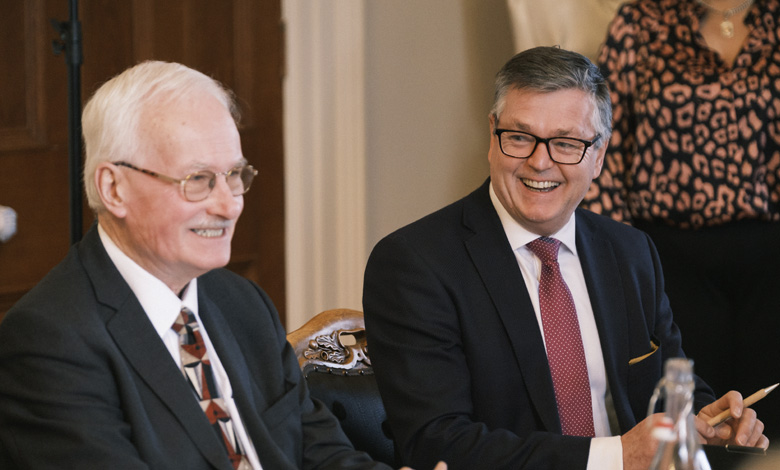
Michael Donnelly, Strategic Investment Board
Another important indirect funding mechanism is procurement. Indirect funding, in this context, means the potential for Government to aggregate its demand for commodities like oxygen, hydrogen and electric vehicles. Then, Government can procure these goods and services to create a multi-year income stream for private sector providers. This type of approach would let the private sector raise finances to deliver the net zero goods and services that will make a difference to our climate change targets.
Kevin Hegarty, Department of Agriculture, Environment and Rural Affairs
We have touched on the role of the public sector or government in relation to providing equity, but I also think consideration must be given to the money that we already spend. Around 50 per cent of every capital £1 spent in Northern Ireland is related to central government. Current budgets are a challenging position and the amount of money from central government is a finite amount, so we must ensure the money being spent is in the correct areas. For example, £327 million has been ringfenced for the successor to the Common Agricultural Policy (CAP). As such, decisions are going to have to be taken on how that money is spent. The work in the development of the Climate Action Plan and the carbon budgets should trigger decisions investment priorities.
The Climate Change Commission (CCC) has stated that it is going to cost around £2.2 billion per year of new money from 2030 to decarbonise the economy. The macro analysis of who will fund that has yet to be done but the OBR has effectively said that the private sector will play a significant role. The Government’s role, therefore, must focus on policy- and market-making.
Mark Ennis, SSE Ireland
To date, SSE has invested £500 million in Northern Ireland and we would love to double that figure. However, there are constraints. SSE as a group has an investment plan of £25 billion over the next decade but it is competing internally for the investment. Quite often, I am asked about the risk profile when compared to the likes of Scotland, the Republic of Ireland, Europe, and elsewhere. Planning is a major constraint, but so too is political stability. We need a pathway for investment and one which is lower risk compared to competitive countries, who are ultimately seeking the same investment.
How important is achieving public buy-in to altering our consumer choice and travel patterns?
Chris Conway, Translink
Transport is the second biggest emitter of greenhouse gases in Northern Ireland and utilises over 30 per cent of our entire energy consumption. Transitioning away from imported petrol and diesel to alternative energy such as electricity, hydrogen, and to some degree biofuels, is a massive shift in technology. However, simply trying to decarbonise our existing transport would be a wholly inefficient approach. Northern Ireland has the highest private car use per capita in Europe, so we need a much broader modal shift.
That modal shift is a huge behavioural change and one that requires leadership to ensure buy-in. Some good examples already exist including congestion charges in London, where the use of public transport subsequently doubled. Those behavioural changes were driven by strong policy leadership, something we really lack.
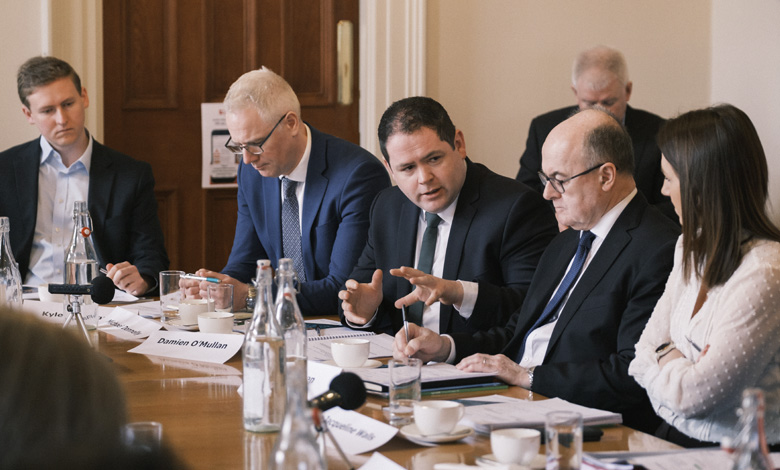
Ronan McKeown, NIE Networks
Public buy-in is hugely important and to that end, we need to simplify the complexity. Decarbonisation of our entire economy is a mammoth task, and each of our sectors are required to break that whole-system plan down into digestible chunks, to ensure we are bringing people along with us. In the transport sector we can see Northern Ireland has been slower than neighbouring areas at adopting electric vehicles and the lack of visible charging infrastructure has held consumers back from making the switch.
Fuel poverty is still a significant challenge and some of the technologies we are talking about are financially inaccessible to individuals and households. So, we need to create support mechanisms that protect and enable the public.
Klair Neenan, SSE Airtricity
The one stop shop solution being utilised in the Republic of Ireland in relation to retrofitting is something we are keen to bring to Northern Ireland. It is not just about deep retrofits, we are working with customers even if they are only making small changes, giving people sustainable solutions to reduce their energy costs.
Debbie Caldwell, Belfast City Council
Public buy-in is key but to achieve it we need a collaborative effort. As councils, with much more limited powers than our English counterparts, we must focus on planning and convening. Through initiatives such as Belfast City Council’s community planning partnerships, our newly established retrofit hub, and the Climate Commission, we are trying to get all parts of the system into one room to create pathways and launch projects. We have undertaken some foundational pieces of work such as our local area energy plan, which provides data on the whole system and the most cost-effective pathway to decarbonise and offers a coordinated series of investments. However, as a region we do not have investment-ready projects and the reason is the absence of development finance to build out a pipeline. We need that funding to carry out feasibility studies and to really unlock capital to flow into those projects.
Richard Rodgers, Department for the Economy
The collaboration between those who want to produce solutions is happening, the difficulty lies in the actions. We need more targeted outcomes following the conversations we as a sector are having. The organisations which are leading the way on decarbonisation are the ones which have challenged their traditional business models and adopted innovative approaches.
Sara Lynch, Queen’s University Belfast
We recently held a student summit as part of the development of our own university net zero strategy and interestingly, it was not energy that people were talking about, but rather public transport access and lack of active travel opportunity across Belfast. To move away from our addiction to cars, they want to see things like safe cycling infrastructure, walking infrastructure, and public transport initiatives. Traditionally, policy has been slow to prioritise a modal shift. The carbon budgets and the Climate Change Act are a welcome emphasis for change in that regard.
Bob Hanna, energy consultant
We need to enable communities in the energy transition. Energy communities are growing in other countries but there has been little progress here in Northern Ireland.
Noel Brady, Construction Industry Training Board Northern Ireland
We have faced government inertia before, and it should not be allowed to stand in the way of the fact that there are companies who want to invest. In the absence of political leadership there are things that can be done. Pathfinder projects are vehicles to progress, and we then need a mechanism to allow them to contract.
John Barry, Queen’s University Belfast
We are at risk of failing to apply the lessons we learned during the pandemic to this crisis. During the pandemic, we had the Chief Science Officer and the Chief Medical Officer, together with government, being trusted sources of information. Academia and research have a role in being a trusted source of evidence for communities. Carbon literacy is very important to getting public buy-in, ensuring that there are no unintended side effects of technological innovation.
What is the role of local authorities in achieving a cleaner and greener future?
Debbie Caldwell, Belfast City Council
The transition represents a huge opportunity to unlock the economic, social, and environmental benefits of local areas to the benefit of all those who live in, work in, and visit them. However, local authorities must also ensure that in seeking to reinvigorate local economies and attract investment, no one gets left behind. People must be offered resources to reskill and be supported in moving out of carbon-intensive supply chains. Additionally, local authorities are ideally situated to act as conduits between sectors and push a whole-system approach. Place-based solutions can help foster collaboration and innovation to release investment. Finally, as John [Barry] has mentioned, two-thirds of the fundamental changes to achieve our climate goals are behavioural. As such, local authorities have an exemplar role in driving those behavioural changes, guiding decisions taken by individuals, businesses, and investors.
John Barry, Queen’s University Belfast
Our economy is set to undergo major structural changes through which some sectors will grow, and others will shrink. We must plan to ensure that the fossil fuel sector gets a decent departure, followed by the establishment of a new sustainable economic model. However, there are limits to economic compensation. There are non-economic aspects to the changes we are going to be asking of our citizens and we need to start those conversations now.
Chris Conway, Translink
The modal shift agenda we are pushing is facing challenges of budget constraints and a lack of political leadership. We see our role as leading the way and we have made progress in the rollout of 100 electric buses in Belfast with a further 38 due in Derry~Londonderry by mid-2023. In addition, 20 hydrogen vehicles are now in service, and we are about to begin a feasibility study to decarbonise Northern Ireland’s rail network. However, we have encountered challenges, a prime example of which is the skills capacity needed to operate and maintain the associated infrastructure for the green technologies we are pursuing. We are working to share that knowledge with other organisations but there is room for a platform that brings that whole-system learning together, and ensures that any policy change that does come forward is landed correctly at a local level.
Bob Hanna, energy consultant
The role of local communities in energy activities is much less developed in Northern Ireland than in any other part of these islands. There are currently only two community energy cooperatives in Northern Ireland, compared with hundreds in other nations. Local authorities have a role to play in facilitating community thinking in areas such as public transport facilitation, district heating, electric vehicle charging infrastructure, and planning permission for community wind and solar projects.
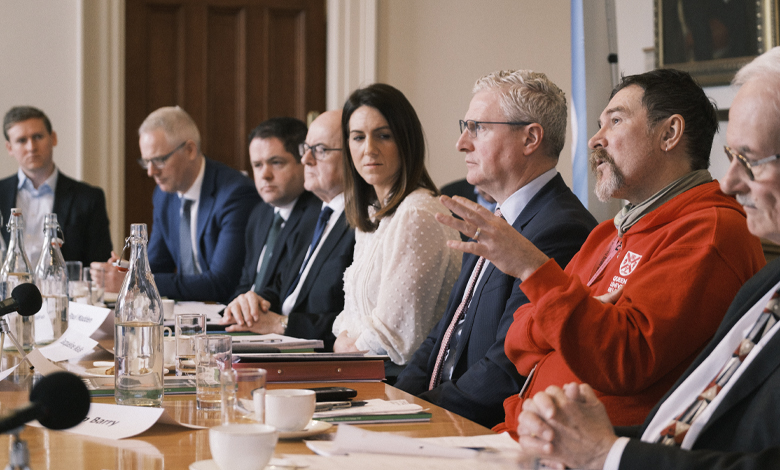
Identify the existing barriers to a net zero future. What is the role of collaboration in overcoming these challenges?
Adrian Bolton, SSE Energy Solutions
The enablement of private investment in fundamental infrastructure programmes is important and therefore, we need to look at public procurement as an enabler of private investment to step in.
Bob Hanna, energy consultant
The general availability of technical and non-technical information which everyone can trust can be a gamechanger. Society has become less trusting of government, multinational companies, and other figures of authority. This is affecting the ability to implement key infrastructure projects, particularly in the energy sector. This is less apparent in countries where there is a history of municipal or regional planning, for example in Denmark, rather than market competition, such as in the UK. Some countries and regions fund organisations to make publicly available technical information that can be relied on by all interest groups in a given situation, as this has been proven to deliver energy infrastructure projects more quickly and with less controversy than before.
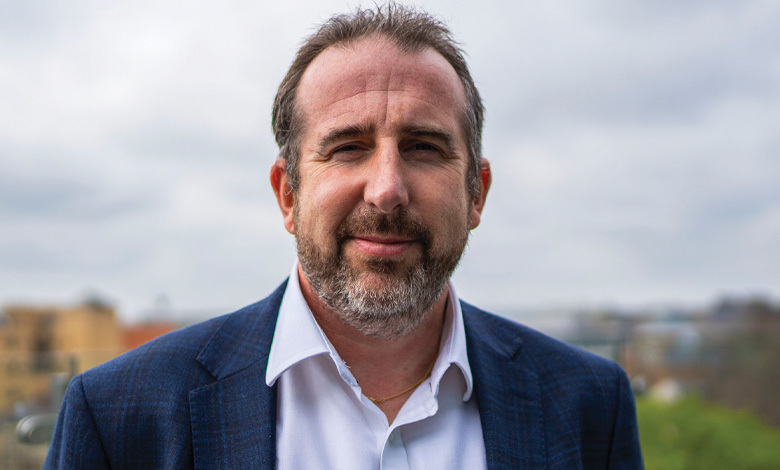
John Barry, Queen’s University Belfast
The inadequate framing of the climate crisis as an emergency is a barrier. The science is telling us we need wartime mobilisation, but that appears to be insufficiently understood.
Chris Conway, Translink
Education needs to change on both a personal and at an organisational level. We know ‘what’ needs to change but we have not quite got the ‘how’. Politicians listen to what they hear on the door, so if we educate the public on energy, the environment, and climate, political will should follow.
Kevin Hegarty, Department of Agriculture, Environment and Rural Affairs
Knowledge is a barrier. The information exists but we need to use it. In preparation for carbon budgets, getting information out from the various sectors has been a challenge, and that will be even more difficult at a political level.
Jacqueline Walls, Belfast Harbour
Collaboration needs to take place at all levels of the supply chain. There is a big appetite in the local economy for driving decarbonisation and a big part of that is that organisations are being asked for their green credentials on the product they supply. If we do not support those businesses, local manufacturers will not be able to compete in the global market.
Paul Madden, Centre for Competitiveness
A lack of urgency is a barrier. Until recently we have not treated this as an emergency. Targets out to 2050 were too far out to spark a crisis mentality, which is needed.
Damien O’Mullan, NI Water
From a delivery point of view, a major challenge is the availability of grid capacity and the capability within the electricity system. The sectors moving towards electrification must have connectivity and flexibility across Northern Ireland.
Michael Donnelly, Strategic Investment Board
What is needed is a single, prioritised, and resourced action plan that everyone can galvanise around and participate in.
Kyle Flanigan, Belfast Harbour
Existing carbon intensive solutions still work. Petrol and diesel can still power our cars, brown electric can still power our buildings, and natural gas or home heating oil can still heat our homes. That is a problem because the cheapest option in the short term is to do nothing. There is scope to start costing carbon into business models now, even without policy, to change mindsets.
Klair Neenan, SSE Airtricity
We do not have the right incentives to encourage households and businesses to make the step changes that are needed.
Paul Isherwood, Housing Executive
Human resource availability and industry capacity. These are in global demand and as we start to stretch target timelines, costs will go up and resources will be at a premium. If we do not start to invest now, we will be hampered in our delivery to 2050.

Noel Brady, Construction Industry Training Board Northern Ireland
Indecisiveness, which originates in the absence of leadership. The pandemic showed that we can act in a crisis and that we can find resources, technology, and people when the will is there.
Sara Lynch, Queen’s University Belfast
We need clear political leadership. Political will can make change through policy and make more decarbonisation requirements mandatory. We talk a lot about cost, but we also need to talk about the cost of carbon in everything we are pricing to incentivise action.
Ronan McKeown, NIE Networks
Northern Ireland is the optimal size to be really agile and get ahead of other countries. I think we have a culture of creating our own barriers, but that mindset must change. It is the doing that will make us successful.
Mark Ennis, SSE Ireland
Most of the local authorities do not articulate the climate crisis on an emergency basis or educate about it. There is a need for a trusted body to get that information across and encourage local authorities to become action orientated.
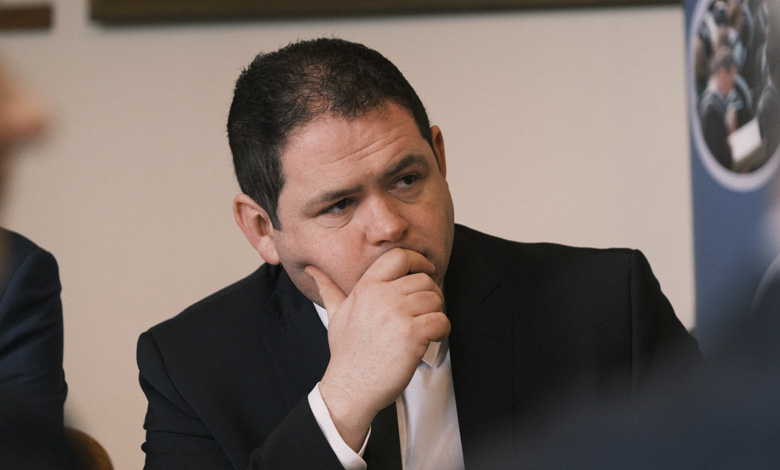
Debbie Caldwell, Belfast City Council
I would point to seed finance. We need to stop offshoring our emissions and take responsibility. A carbon tax would be useful in this regard.
Richard Rodgers, Department for the Economy
We need the public sector to have a higher risk appetite to enable public and private sector collaboration to deliver energy decarbonisation more urgently.
Nathan Sanders, SSE Energy Solutions
Silo mentalities are a barrier. We need collaboration and trusted partnerships. Additionally, we need to increase our speed to execute. Capital exists but we need to get projects moving to boost confidence in the future market, to unlock future investment. We need to ensure that we are levelling up. We cannot leave anyone behind on this journey and our work must deliver social value.

